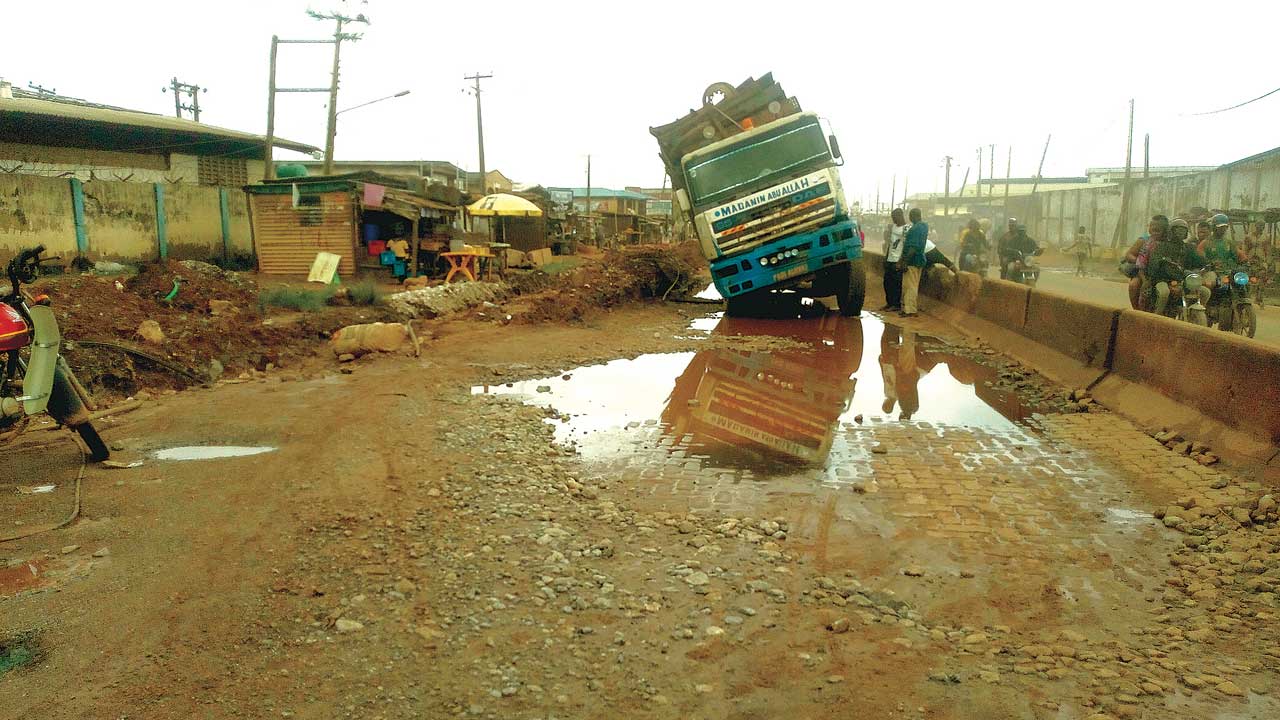By Ebun-Olu Adegboruwa
Commit to an urgent reconstruction of all interstate highways that form the backbone of Nigeria’s road transport network as a way of reconnecting Nigerians back with their country to make road travel the pleasant experience that it used to be. Commit to a strategy of ongoing rehabilitation and maintenance programme that will ensure that all existing federal roads are safe and motorable, embark on a National Infrastructural Development Programme that will ensure the construction of 3,000km of superhighway including service trunks and building of up to 4,800km of modern railway lines.
Encourage and financially support States with sprawling urban centres to embark on intra city metro lines and bus systems, improve and modernize aviation infrastructure, ensuring all our airports and aircrafts are compatible with international safety standards, renovate, enlarge and modernize the nation’s ports to cope with growing maritime traffic, construct two deep sea ports and create a functional inland waterway transport system.” (APC Manifesto 2015, copied from INEC Website) In 2015 while canvassing for the votes of Nigerians, the All Progressives Congress, APC, promised many things. Let us review those promises in relation to the network of roads in Nigeria. From the excerpts lifted from the APC Manifesto, two major promises were made to the people of Nigeria concerning roads, first was that APC ‘commit to a strategy of ongoing rehabilitation and maintenance programme that will ensure that all existing federal roads are safe and motorable’ and the second promise was to ‘embark on a National Infrastructure Development Programme that will ensure the construction of 3,000km of Superhighway including the service trunks’. In essence, APC committed itself to rehabilitate and maintain ALL federal roads to make them safe and motorable. This solemn promise was made in 2015 and seven years down the line, it is difficult to say that it has been fulfilled. In the South West of Nigeria, all the major highways are either abandoned or they have collapsed completely.
I had cause to travel by road recently, from Lagos to Ore, to Akure, to Ado-Ekiti, to Owo, to Akungba Akoko, to Lampese, etc. The experience was not funny at all, given all that I had previously heard from the Honourable Minister of Works and Housing, about how the Buhari administration has transformed roads in Nigeria and thus made traveling experience a pleasant one. For good order, the Constitution in its section 14 (2) (b) states clearly that the security and welfare of the people shall be the primary purpose of government. According to the learned authors of Merriam-Webster online dictionary, ‘welfare’ connotes ‘the state of doing well, especially in respect to good fortune, happiness, well-being, or prosperity.’ How happy can anyone be sleeping on the road for days, not because he has no bed at home, but due to the collapsed state of the roads, which have become mostly unmotorable. It is difficult to describe the current situation of the expressway from Sagamu to Ijebu-Ode and beyond, in terms of its mobility. You navigate it and then wonder if there is still a government in place in Nigeria. Why do they wait till the roads have deteriorated completely before steps are taken to effect repairs?
Now the Honourable Minister of Works and Housing is one who has earned the admiration of Nigerians during his stint as Governor of Lagos State, in the quality of leadership, the robust intellectual content of his landmark policies and how he inspired other intellectuals to join politics. So, when he was appointed by the President in 2015 as the Minister of Power, Works and Housing, the expectations were very high indeed. No doubt that the challenges that plagued the power sector seemed to have overwhelmed him, given his previous declarations whilst in the opposition camp that they could be resolved in just six months.
Thus, during his first four years in office, attention was more on the power sector than the roads across the nation. But the promise remained with the APC that it would execute the two-pronged covenant of road rehabilitation and maintenance and road construction. Now I must give it to the federal government that under this same administration, the Apapa-Oshodi expressway has received massive rehabilitation, ditto the Lagos-Ibadan expressway and some portions of the Sagamu-Benin expressway. And I once listened to the Honourable Minister on the wonders of the Ogbomoso-Ilorin expressway too. This is about the summary of road rehabilitation in the South West region in eight years and it would seem that this is the same or similar situation with other regions of Nigeria.
The Third Mainland Bridge has since collapsed in major portions whilst the poor job being touted by Julius Berger Plc as road rehabilitation between Lagos and the Sagamu interchange has dwarfed any claim to success on that portion of the road. Months after the construction giant had claimed to have completed some sections of the road, you would see its workers blocking the road for reconstruction and weeks thereafter, those
No serious-minded person will ever accept the shoddy job that Julius Berger is parading as road construction, after putting people through several months of suffering and agony. Personally, I have searched for any new super highway of about 300 kilometers embarked upon by the federal government in all of the South West region and I cannot find any but it is possible that this may be ongoing in other parts of Nigeria which I have not had the privilege of visiting. To me personally, the Epe-Ijebu-Ode expressway represents the kind of road rehabilitation that any government should bequeath to its people. It is a federal road said to have been constructed jointly by the governments of Lagos and Ogun States. To be continued tomorrow Adegboruwa is a Senior Advocate of Nigeria (SAN)

